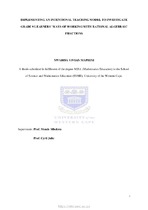| dc.contributor.advisor | Mbekwa, Monde | |
| dc.contributor.advisor | Julie, Cyril | |
| dc.contributor.author | Maphini, Nwabisa Vivian | |
| dc.date.accessioned | 2019-07-30T09:11:56Z | |
| dc.date.available | 2019-07-30T09:11:56Z | |
| dc.date.issued | 2019 | |
| dc.identifier.uri | http://hdl.handle.net/11394/6943 | |
| dc.description | Magister Educationis - MEd | en_US |
| dc.description.abstract | In South Africa it is widely known that most learners struggle with mathematics. The results for mathematics are poor. The department of basic education offers a number of intervention programmes to assist learners in mathematics but the problem still persists. Algebra is the most basic and important topic in mathematics as it becomes an element in almost all the other topics in mathematics curriculum. Algebraic fractions in particular are a challenge for most leaners. Research shows that learners commit a number of errors when they work with algebraic fractions.
The study investigated the implementation of an intentional teaching model into grade 9 mathematics learners’ ways of working with rational algebraic fractions. An intentional teaching model is a teaching strategy which emphasizes teaching intentions or teaching objectives are brought to the fore during a lesson, the model emphasizes the use of spiral revision and assessment for learning. Ways of working in this study refers to the way in which learners deal with algebraic fractions when they simplify them including the errors they commit from the misconceptions they have about aspects of working with fractions. The study was conducted in a group of grade 9 mathematics learners at Gugulethu High school, which is located in Guguletu, a township in the Western Cape Province of South Africa.
The study is premised on a qualitative research paradigm which focuses on studying situations in their natural settings and applying an interpretive perspective. Data was collected by means of observation and video recording of lessons while learners were engaged in working with algebraic fractions. Learners’ written work was analysed as part of the data collection. The results of the study show that leaners commit a number of errors when they manipulate algebraic fractions. Among other errors are: (i) Cancellation errors which had the highest frequency of occurrence (ii) Defractionalisation (iii) No recognition of the common factor and (iv)Exponential laws error. It was found that the learners’ ways of working with algebraic fractions are mostly characterised by their misunderstanding of exponential laws and difficulty in working with fractions needing the use of factorisation to simplify and find the lowest or highest common denominator during addition or subtraction. The results of the study also reveal that learners struggle to articulate extensively or in detail what they are actually doing as they simplify rational algebraic fraction. | en_US |
| dc.language.iso | en | en_US |
| dc.publisher | University of the Western Cape | en_US |
| dc.subject | Intentional teaching model | en_US |
| dc.subject | Mathematics education | en_US |
| dc.subject | School learners | en_US |
| dc.title | Implementing an intentional teaching model to investigate grade 9 learners’ ways of working with rational algebraic fractions | en_US |
| dc.rights.holder | University of the Western Cape | en_US |

